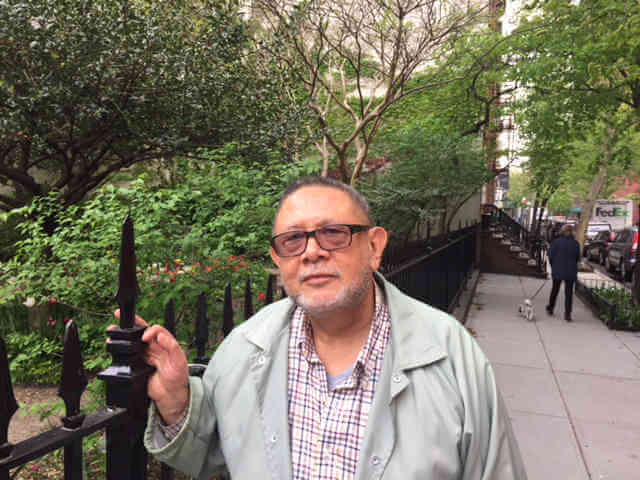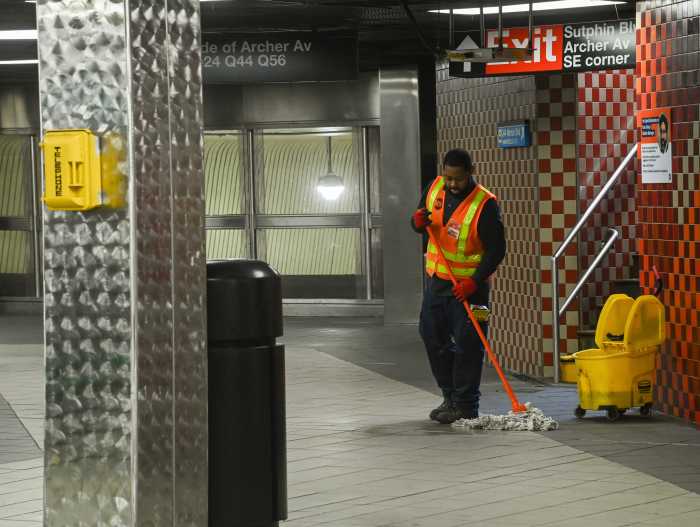The Colombian-American writer Jaime Manrique, author of the powerful new novel “Like This Afternoon Forever,” is both an imp and an iconoclast. The poet, novelist, and teacher, who turns 70 this month, just received the prestigious Bill Whitehead Award for Lifetime Achievement from the Publishing Triangle.
“I was glad to receive it before I kicked the bucket,” he winkingly told Gay City News recently over cheeseburgers and fries at the Village Bistro close to his home in Greenwich Village.
The new book, the award, as well as his birthday and all the Stonewall 50/ WorldPride hoopla have Manrique looking forward as well as back, with both a hard gimlet stare and the sparkly eyes of the child he was growing up in tranquil Barranquilla where the Rio Magdalena pours into the Caribbean Sea.
“I lived in Barranquilla until I was six and then Bogota,” he said. “Bogota was much smaller then, before the climate changed. It was very rainy and cold and green, and I loved the mountains surrounding the city. I would cut classes and go hiking or go see movies with Chaplin or Laurel & Hardy, Mexican movies, and ‘Tarzan, King of the Jungle.’ Now Bogota is incredibly polluted. They have yellow alerts and people walking around wearing masks.”
Manrique emigrated to Florida with his mother in 1966 and then spent years alternately in New York, Venezuela, and Bogota with his partner of 30 years, the late painter Bill Sullivan.
His new book tells the romantic and tragedy-laced story of two priests — like Manrique, also country boys who moved to the bustling capital — whose love is threatened by the violence of a country with a long history of oppression. It’s been named one of 10 best new Latinx reads of the summer by Rigoberto Gonzalez, writing at nbcne
Both homosexuality and the legacy of the government’s decades-long conflict with the Communist guerrilla FARC (Fuerzas Armadas Revolucionarios de Colombia) remain highly charged issues in Colombia. Manrique’s driving them into a collision course with each other in “Like This Afternoon Forever” reveals once again how the personal is always political and not ever like a car in the middle of a traffic jam that always stays in its own separate lane.
The novel is serious stuff, but reads, as the gay novelist Christopher Bram notes, “as quick and intense as a fairy tale, yet as real and brutal as contemporary Latin America.”
The novel was first published in Spanish last year, though Manrique wrote it in English.
“I’ve heard from several seminarians and an ex-priest in Colombia who were very moved because in some ways they felt the book told their story,” he said. “They became disenchanted with that life and had left the Church and thanked me for telling that story, the first book in Colombia that has.”
Spoiler alert: The book is based on actual events. The BBC reported that Father Richard Piffano, 37, and Father Rafael Reatiga, 35, “were found shot dead in a car in southern Bogota in January, 2011. The priests had agreed to a suicide pact after one of them was diagnosed with AIDS, but contracted hitmen because they could not bring themselves to carry it out.” The relatives of the priests continue to claim their deaths were the result of an armed robbery and to deny that they were lovers.
Manrique heard the priests’ story soon after his partner Sullivan’s death from AIDS had sent him into a “nervous breakdown,” he said. For his research he went to their neighborhoods in Bogota and talked to young men enrolled in seminaries. Both suicide and homosexuality remain forbidden among the Catholic faithful. Manrique calls far right Colombian President Iván Duque Márquez, elected last June, “very homophobic.”
“He’s trying to repeal the gay marriage law and change the curriculum in schools to not teach any gay history,” he said.
The social stigma of homosexuality and the nationwide PTSD from cultural and political violence ensured the novel would be controversial in Colombia, but Manrique is no stranger to his art becoming incendiary. Following the publication of his satiric novel “Colombian Gold: A Novel of Power and Corruption” in 1983, Manrique was “kicked out off the country pretty much,” he said. “I insulted a government official. I accused him of corruption. They charged me with ‘disrespect of authority.’ Somebody told me they had a warrant for my arrest. After that, I didn’t go back for 20 years.”
A few weeks ago in his speech at the ceremony for the Whitehead Award, Manrique said, “Once more, the queer people of the world, indeed all of humanity, are under the threat of totalitarianism. That’s why we as writers must endeavor to write with our fingers and our minds afire. For wherever we find racism, homophobia, and misogyny entrenched, we must march toward that evil structure and tear it down.”
Recalling that evening, he said, “At first I wanted to write something funny and then say ‘thank you’ and that’s it. But then my current boyfriend said, ‘No, Jaime, you have to have to use it to inspire people to get out here and do something.’”
The current political climate’s stakes reminded Manrique of when he first heard about the Stonewall Rebellion in 1969.
“I had read it in Time magazine or something and I remember thinking, ‘Oh, my God, this is happening!’ I couldn’t believe it. I thought, ‘Maybe there’s hope for me, that I will be happy someday, that things will be better for homosexuals.’”
As for the upcoming celebration of Stonewall’s 50th anniversary, he said, “In the past 50 years, it has changed a lot for us as people being gay and it’s a different world we live in. We don’t have to hide anymore, we can be out anywhere we want to, but that doesn’t mean that gays are easily accepted everywhere. They are many places where the prejudice remains, it’s all under the skin.”
When asked what he will be doing for Pride this year, Manrique noted that he’ll be in the parade on a float with other LGBTQ writers sponsored by Barnes & Noble. “I’m thinking about maybe going in drag as Divine.”
LIKE THIS AFTERNOON FOREVER | By Jaime Manrique | Akashic/ Kaylie Jones Books | $11.96 | 244 pages
Jaime Manrique will read from “Like This Afternoon Forever” in conversation with Dr. Lawrence D. Mass at the Bureau of General Services — Queer Division, LGBT Community Center, 208 W. 13th St., room 210, on Jun. 13 at 7 p.m. A $10 donation is suggested.



























